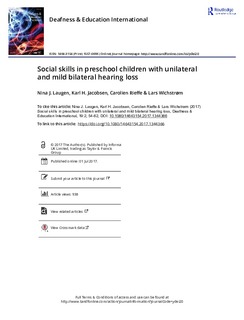| dc.contributor.author | Laugen, Nina Jakhelln | |
| dc.contributor.author | Jacobsen, Karl Henry | |
| dc.contributor.author | Rieffe, Carolien | |
| dc.contributor.author | Wichstrøm, Lars | |
| dc.date.accessioned | 2018-05-02T07:48:08Z | |
| dc.date.available | 2018-05-02T07:48:08Z | |
| dc.date.created | 2017-08-18T14:38:03Z | |
| dc.date.issued | 2017 | |
| dc.identifier.citation | Deafness and Education International. 2017, 19 (2), 54-62. | nb_NO |
| dc.identifier.issn | 1464-3154 | |
| dc.identifier.uri | http://hdl.handle.net/11250/2496626 | |
| dc.description.abstract | Hearing loss may represent a risk for developing social skills difficulties; however, little is known about the potential risk resulting from unilateral or mild bilateral hearing loss (UMHL). We compared the social skills of 14 children with UMHL and 21 children with moderate to severe hearing loss (MSHL) with those of 123 children with typical hearing (TH). All the children were 4–5 years old, and all the children with hearing loss used hearing aids. The study was carried out in Norway. Associations between social skills and age at amplification and vocabulary skills were examined. The children with UMHL had lower social skills than the TH children, whereas the children with MSHL received scores similar to those of the TH children. The children with UMHL were detected and amplified later than the children with MSHL. Early amplification was associated with better social skills but not with better vocabulary. The results suggest that despite a limited effect on vocabulary development, early intervention is likely to promote social skills development in children with UMHL. | nb_NO |
| dc.language.iso | eng | nb_NO |
| dc.publisher | Taylor & Francis | nb_NO |
| dc.rights | Attribution-NonCommercial-NoDerivatives 4.0 Internasjonal | * |
| dc.rights.uri | http://creativecommons.org/licenses/by-nc-nd/4.0/deed.no | * |
| dc.title | Social skills in preschool children with unilateral and mild bilateral hearing loss | nb_NO |
| dc.type | Journal article | nb_NO |
| dc.type | Peer reviewed | nb_NO |
| dc.description.version | publishedVersion | nb_NO |
| dc.source.pagenumber | 54-62 | nb_NO |
| dc.source.volume | 19 | nb_NO |
| dc.source.journal | Deafness and Education International | nb_NO |
| dc.source.issue | 2 | nb_NO |
| dc.identifier.doi | 10.1080/14643154.2017.1344366 | |
| dc.identifier.cristin | 1487313 | |
| dc.description.localcode | © 2017 The Author(s). Published by Informa UK Limited, trading as Taylor & Francis Group This is an Open Access article distributed under the terms of the Creative Commons Attribution-NonCommercial-NoDerivatives License (http://creativecommons.org/licenses/bync-nd/4.0/), which permits non-commercial re-use, distribution, and reproduction in any medium, provided the original work is properly cited, and is not altered, transformed, or built upon in any way. | nb_NO |
| cristin.unitcode | 194,67,40,0 | |
| cristin.unitname | Institutt for psykologi | |
| cristin.ispublished | true | |
| cristin.fulltext | original | |
| cristin.qualitycode | 1 | |

